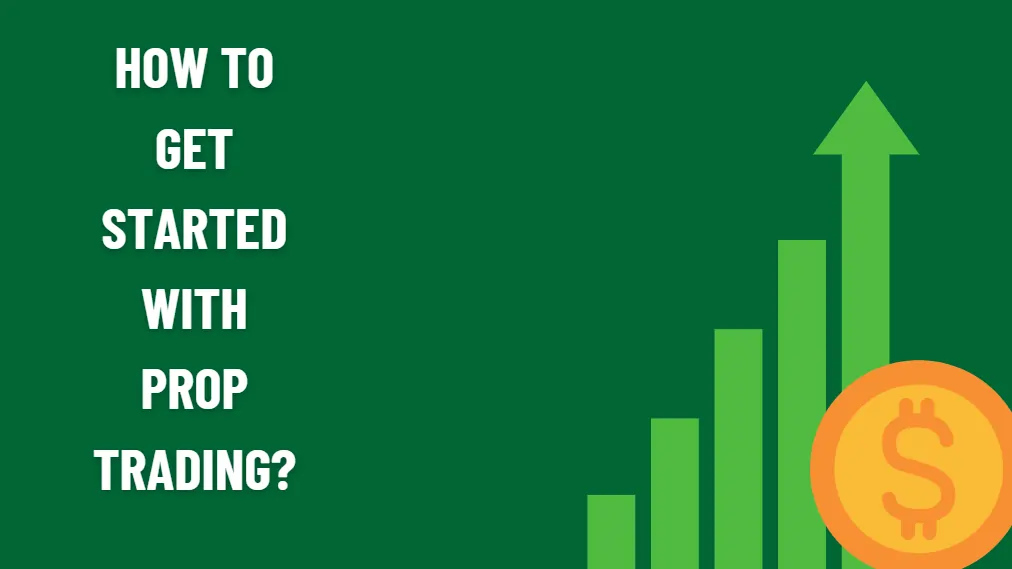
Proprietary trading, often referred to as prop trading, is a financial practice where firms or banks trade financial instruments using their own capital, rather than clients' funds. This approach allows these institutions to earn profits directly from market movements.
In this comprehensive article, we will explore the intricacies of proprietary trading, including its strategies, risks, benefits, and the overall impact it has on the financial markets.
🔗 What is Prop Trading?

Prop Trading refers to the practice where financial institutions, such as banks or hedge funds, engage in buying and selling financial instruments using their own capital rather than client funds. The primary objective of prop trading is to generate profits directly from market movements and price fluctuations.
This type of trading allows firms to capitalize on perceived market inefficiencies, leveraging their expertise and resources to achieve higher returns compared to traditional investment strategies that rely on client assets.
What is a Prop Trader?

A prop trader, or proprietary trader, is an individual who engages in trading financial instruments—such as stocks, bonds, currencies, and derivatives—using the capital provided by a proprietary trading firm.
Unlike retail traders who use their own funds, prop traders operate with the firm's money, allowing them to take on larger positions and potentially earn higher returns. The primary objective of a prop trader is to generate profits for the firm, and in return, they typically receive a share of the profits they create.
What is a Prop Trading Firm?

Prop Trading Firm is a specific type of financial institution that specializes in proprietary trading. These firms employ skilled traders who utilize various strategies to exploit market opportunities, and they operate using the firm's own capital.
Prop trading firms typically provide their traders with access to advanced technology and research tools, enabling them to analyze market data and execute trades efficiently. Unlike traditional brokerage firms that earn commissions by executing trades for clients, prop trading firms retain 100% of the profits generated from their trades.
🔎 How Do Prop Firms Work?

Proprietary trading firms, or prop firms, operate by using their own capital to engage in trading activities across various financial markets.
Unlike traditional brokerage firms that earn commissions from client transactions, prop firms retain all profits generated from their trades, allowing them to maximize earnings while assuming associated risks.
At the heart of a prop firm's operations is a team of skilled traders who are allocated capital from the firm to trade with. These traders typically share a percentage of the profits they generate, creating a performance-driven environment. For example, if a trader earns $100,000 in profits with a 60/40 profit-sharing agreement, they keep $60,000 while the firm retains $40,000.
Effective risk management is crucial for prop firms. They implement strict protocols to minimize potential losses, such as setting limits on trade sizes and maximum exposure to specific securities. Continuous monitoring of traders’ performance ensures adherence to these risk parameters.
Prop firms also invest heavily in advanced technology and analytical tools that provide real-time market data. This enables traders to analyze trends and execute trades swiftly. By employing diverse strategies—such as statistical arbitrage and high-frequency trading—prop firms aim to capitalize on market inefficiencies while managing risks effectively. Overall, they play a significant role in enhancing market liquidity and efficiency.
How Do Prop Firms Make Money?

Proprietary trading firms, or prop firms, generate revenue through several key methods:
✔ Key Characteristics of Prop Trading

One of the defining characteristics of prop trading is the use of the firm's own capital for trading activities, rather than relying on client deposits. This unique approach allows firms to have full control over their investment decisions and strategies.
By utilizing their own funds, proprietary traders can engage in larger trades and take on positions that might be too risky for individual investors or traditional brokerage firms. This access to significant capital enables firms to pursue a wider range of opportunities and potentially generate higher returns. Additionally, it fosters a sense of ownership and accountability among traders, as their performance directly impacts the firm's profitability.
Prop trading is inherently associated with a high-risk, high-reward dynamic. Since firms are trading with their own money, they face the potential for substantial profits but also significant losses. This risk-reward relationship is a crucial aspect of prop trading, as traders must carefully evaluate their strategies and market conditions to make informed decisions.
The ability to take calculated risks can lead to impressive gains; however, it also requires robust risk management practices to mitigate potential downsides. Firms often implement strict risk parameters and monitoring systems to ensure that traders do not exceed acceptable loss thresholds while still pursuing lucrative opportunities.
Firms engaged in prop trading typically possess superior market knowledge compared to individual investors. This advantage stems from their access to advanced analytical tools, prop research, and a wealth of historical data that can inform trading decisions. Prop traders often have teams dedicated to market analysis, providing insights into economic trends, corporate performance, and geopolitical events that may influence asset prices.
This extensive market knowledge allows firms to identify inefficiencies and opportunities that others might overlook, enabling them to execute more strategic trades.
⚙ Strategies Used in Prop Trading

Prop traders utilize a variety of strategies to maximize their returns. Some of the most common strategies include:
Advantages of Prop Trading

- High-Profit Potential: Prop trading allows firms to keep 100% of the profits generated from trades, unlike traditional brokerage models that earn only commissions. This structure can lead to significantly higher earnings for both the firm and its traders when successful trades are executed.
- Access to Capital: Traders at prop firms have access to significant capital provided by the firm, enabling them to take larger positions than they could with personal funds. This access allows traders to leverage their strategies more effectively, potentially increasing returns.
- Advanced Technology and Resources: Prop firms typically invest in sophisticated trading platforms, analytical tools, and real-time market data. This technological edge can enhance traders' decision-making processes and improve their chances of success in the market.
- Flexibility in Trading Strategies: Prop traders often have the freedom to develop and implement their own trading strategies without the constraints that come with managing client funds. This autonomy fosters innovation and allows traders to adapt quickly to changing market conditions.
- Educational Support and Mentorship: Many prop firms provide training programs, mentorship, and resources for their traders. This support helps new traders develop their skills and gain valuable insights from experienced professionals in the industry.
Disadvantages of Prop Trading

- High-Pressure Environment: The nature of prop trading can create a high-pressure atmosphere where traders are expected to perform consistently and generate profits. This pressure can lead to stress and may impact decision-making negatively.
- Risk of Losses: Since prop traders use the firm's capital, they face significant risks if trades do not go as planned. Losses can directly affect both the trader's income and the firm's financial health, especially if leverage is employed aggressively.
- Regulatory Challenges: The proprietary trading industry is subject to regulatory scrutiny, particularly after events like the 2008 financial crisis. Compliance with regulations can impose additional operational constraints on prop firms, affecting their strategies and profitability.
🔎 How to Get Started with Prop Trading

Entering the world of proprietary trading can be an exciting yet challenging endeavor. Here’s a step-by-step guide to help you get started on your journey as a prop trader.
1. Educate Yourself
A strong foundation in finance, economics, mathematics, or a related field is beneficial for aspiring prop traders. While formal education is not always mandatory, it can provide you with the analytical skills necessary for success. Consider taking courses related to trading strategies, risk management, and market analysis. Additionally, familiarize yourself with trading platforms and tools used in the industry.
2. Develop Trading Skills
Before joining a prop firm, it's crucial to develop your trading skills. Start by practicing with a personal trading account or using simulated trading platforms that allow you to trade without risking real money. Focus on understanding different trading strategies, market dynamics, and risk management techniques. Continuous learning through books, online courses, and webinars can also enhance your knowledge.
3. Build a Track Record
Having a demonstrable track record of successful trading is often essential when applying to prop firms. This could include documenting your trades, analyzing your performance, and showcasing your ability to generate profits consistently. If possible, gain experience through internships or entry-level positions in financial institutions to strengthen your resume.
4. Research Prop Trading Firms
Not all prop trading firms are created equal. Research various firms to find those that align with your trading style and goals. Look for firms that offer training programs, access to advanced technology, and favorable profit-sharing arrangements. Pay attention to their reputation in the industry by checking reviews and testimonials from current or former traders.
5. Apply for Positions
Once you have developed your skills and identified suitable firms, begin applying for positions as a prop trader or trading assistant. Be prepared for rigorous interviews that may include assessments of your analytical skills, problem-solving abilities, and understanding of financial markets.
6. Participate in Trading Challenges
Many prop firms require candidates to complete a trading challenge or evaluation process before being offered a funded account. These challenges typically involve meeting specific profit targets within a simulated trading environment. Successfully passing these challenges can demonstrate your trading competence and commitment to the firm.
7. Join a Prop Firm
If you successfully manage the application process and complete any required challenges, you may receive an offer to join a prop firm as a trader. Once onboarded, take advantage of the training and resources provided by the firm to refine your strategies and enhance your performance.
Help Section
How do Prop Trading Firms Operate?
Prop trading firms use their own capital for trading, employing skilled traders who share in the profits generated from trades.
What are The main Strategies used in Prop Trading?
Common strategies include arbitrage, statistical arbitrage, high-frequency trading, and global macro trading to exploit market inefficiencies.
What is a Prop Trader?
A prop trader is an individual who trades financial instruments using capital provided by a proprietary trading firm, aiming to generate profits.
How do Prop Firms make money?
Prop firms earn money through profit-sharing with traders, challenge fees, monthly subscriptions, spreads, and performance fees based on profitability.
What are The Advantages of Prop Trading?
Advantages include high profit potential, access to significant capital, advanced technology, flexible strategies, and educational support from firms.
What are The Disadvantages of Prop Trading?
Disadvantages include a high-pressure environment, risk of significant losses, and regulatory challenges that can impact operations.
How can I start Prop Trading?
To start prop trading, educate yourself about financial markets, develop trading skills, build a track record, and apply to prop firms.
What qualifications do I need to become a Prop Trader?
While formal education is beneficial, strong analytical skills, a solid understanding of market dynamics, and a proven track record are essential.
Are Prop Trading Firms Regulated?
Yes, prop trading firms are subject to regulatory scrutiny to ensure compliance with financial laws and manage systemic risks in the market.
🔗 Conclusion

Prop trading represents a dynamic aspect of modern finance where firms leverage their capital and expertise to engage directly with financial markets. While it offers opportunities for significant profits through various sophisticated strategies, it also entails considerable risks that must be managed effectively.
Understanding proprietary trading is essential not only for professionals within the finance industry but also for anyone interested in how these practices influence broader market dynamics.
By balancing innovation with prudent risk management practices, proprietary trading can continue to play an essential role in enhancing market liquidity and efficiency while contributing positively to the financial ecosystem as a whole.






